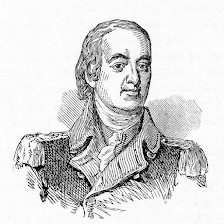Who would have thought that an American Patriot, A Lord of the British Empire, served as a General in the Continental Army?
When Henry the first Earl of Stirling died his son, James
Alexander was the rightful heir, but he fled Scotland in 1716 after taking part
in the Jacobite Rising and settled in New York. James never claimed the title,
but upon his death, his son William Alexander became heir to the Earldom of
Stirling. Sometime after 1756, William sought and claimed the title by a
Scottish Court. But the House of Lords overruled the claim and granted
Alexander the title of Lord.
William Alexander, Lord Stirling was a colonel in the New Jersey colonial militia when the American Revolutionary War began. A wealthy man, he supported the Patriot cause by outfitting his unit at his
own expense. He distinguished himself early and by March of 1776, he was appointed a brigadier general in the Continental Army. That same August, while commanding the 1st Maryland Regiment he fought and lost the Battle of Long Island. He was taken prisoner, but his heroic actions allowed General George Washington's troops to escape.
He was eventually released in a prisoner exchange and promoted
to major general. General Washington held Lord Stirling in high regard and while
detained on personal business for two months placed Lord Stirling in command of
the entire Continental Army. Stirling learned of a conspiracy of discontented Continental officers seeking
to remove Washington as Commander-in-Chief and replace him with General Horatio
Gates. He exposed the treachery to General Washington.
This Scottish American major general, one of the highest-ranking
generals under Washington, also fought in the battles of Trenton, Brandywine, Germantown,
and Monmouth.
In 1781, when Washington and the French took their joined
armies south for the Battle of Yorktown Stirling commanded part of the
Northern Army left behind to guard New York. He was a heavy drinker, suffered
poor health, and died in January 1783 only months before the end of the war.
William Alexander Lord Stirling was buried at Trinity Church in New York City.
What’s the story about titled Americans?
The original thirteenth amendment that was almost ratified
in 1812 addressed that very issue. Here’s the text of the proposed Titles of
Nobility Amendment to the United States Constitution.
“If any citizen of the United States shall accept, claim,
receive or retain, any title of nobility or honour, or shall, without the
consent of Congress, accept and retain any present, pension, office or
emolument of any kind whatever, from any emperor, king, prince or foreign
power, such person shall cease to be a citizen of the United States, and shall
be incapable of holding any office of trust or profit under them, or either of
them.”
Had it passed the current Thirteenth Amendment that abolished
slavery would have become the Fourteenth Amendment. You can learn more about this
missing amendment: https://constitutioncenter.org/blog/the-case-of-the-missing-13th-amendment-to-the-constitution#:~:text=That%20%22missing%22%20proposal%20was%20called,a%20pension%2C%20without%20congressional%20approval.


No comments:
Post a Comment
Thanks for commenting, please check back for our replies!